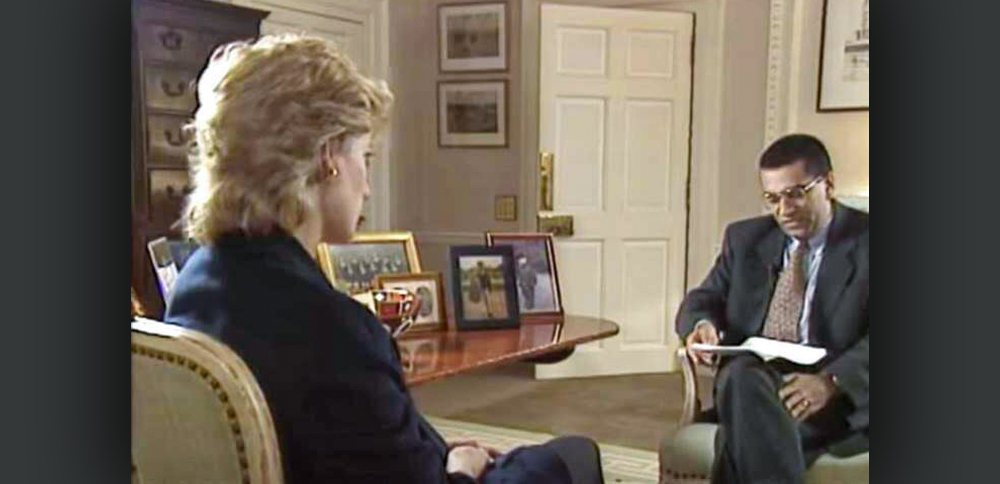By Dom Serafini
The BBC, the U.K.’s public broadcast system, has two components: a bureaucratic and inadequate management and a respected and objective news staff. Now the news staff is under attack and management is siding with the attackers, as is outlined in a 127-page report by former Justice of the U.K. Supreme Court, John A. Dyson (a.k.a. Lord Dyson), who noted that the news division had a “serious breach” of BBC guidelines.
The issue that is causing such hoopla is the interview that BBC journalist Martin Bashir did with Princess Diana 25 years ago (pictured above).
The BBC is now accused of having obtained access to the late princess by using deceptive means. And when the producer of the segment, Mark Killick, denounced Bashir’s actions, he was dropped from the program.
It is also said that the interview caused enormous stress to Diana’s children, Prince William and Prince Harry, then 13 and 11 years of age, respectively.
When the 54-minute interview was aired on BBC1 as part of the Panorama documentary series on November 20, 1995, Princess Diana and Prince Charles had been separated for three years. The interview exposed the reality of their marriage so that Queen Elizabeth II agreed to a formal divorce, which took place a year later.
Here’s my analysis. The suffering that Diana’s children experienced was caused by their father’s actions and not by the interview. Prince Harry reported that his father warned him and William that their lives would be just as hard as his was, and that he didn’t do anything to change the course of history.
The monarchy is not a democratic or transparent institution. British people cannot expect honest, straightforward information from an institution whose motto is, “Never complain, never explain.”
However, since the monarchy is part of Britain’s political fiber (with the Queen being the head of state, as it is a constitutional monarchy, albeit with an unwritten constitution), people are entitled to know of their comings and goings — whether the royals like it or not.
Now, we tend to justify bribing people from dictatorial states in order to get news that would otherwise not be forthcoming. We call the exercise “spying” at government levels, but it’s simply finding a “source” on a journalistic level. Would anyone at the BBC complain if news from North Korea, Iran, China, or Russia (just to mention the main authoritarian states) were to be obtained under deceptive means? Obviously not! So why should a monarchy be treated any differently than an authoritarian state?
If Bashir needed to secure an official interview with a royal member of the British monarchy using unorthodox means because the news that he was seeking to reveal would have otherwise been obfuscated, shouldn’t that be considered admissible? After all, no one questions the contents of the interview, only the means by which it was obtained.
Following Lord Dyson’s report, Martin Bashir released a statement apologizing for mocking up some documents used to secure the interview. However, he added that, “In fact, despite his other findings, Lord Dyson himself in any event accepts that the princess would probably have agreed to be interviewed without what he describes as my ‘intervention’.”
In the 2014 Reuters Institute for the Study of Journalism’s report, “Evading the Censors: Critical Journalism in Authoritarian States,” published by the University of Oxford, there is a list of deceptive means that might be used to obtain news that is generally accepted by the media.
Even in countries where transparency by government officials is prized, news reporters often have to resort to subterfuge in order to obtain valuable news, as demonstrated in the classic case of the Pentagon Papers. In 2015, 44 years after the release of the secret papers by The New York Times, reporter Neil Sheehan confessed that he obtained the papers by defying the explicit instructions of his confidential source (Daniel Ellsberg, then a U.S. Defense Department analyst).


[…] The BBC Under Attack: An Analysis […]